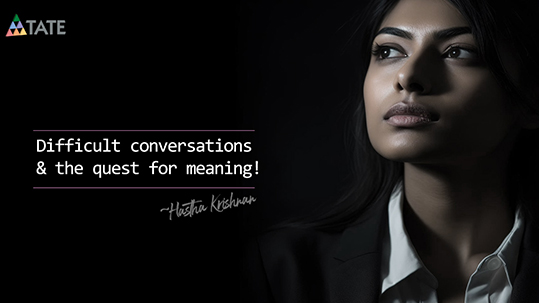“Difficult conversations do not just involve feelings, they are at their very core about feelings.” ~ Douglas Stone, Difficult Conversations: How to Discuss What Matters Most
As humans, we are hard-wired through Biology to understand what there is, what to do about it, and the crucial difference between knowing and doing. This distinction drives our innate need for meaning—we don’t just seek to know what there is, but why. In this piece, I explore the meta-ontological aspects of having difficult conversations rather than delving into a how-to guide.
As society has evolved from the Renaissance into modernity, the quest for meaning has shifted from metaphysics and the arts to the realm of science. While scientific precision has its merits, it often must address our existence’s philosophical depths. This shift has come at a tremendous cost; we now see the world in shades of grey rather than in full colour, losing the richness that philosophical inquiry brings.
Finding Strength in Difficult Conversations
In the professional realm, we often face the necessity of difficult conversations. Who, in their right mind, bravely ventures into these tough talks? Most of us shy away from conflict unless driven by a desire to dominate. However, avoiding difficult conversations leads to muddled situations, poor decisions, and unresolved issues.
Years of experience as a senior executive search consultant have taught me that there’s no escaping difficult conversations. The longer we avoid them, the worse the unspoken issues become. While these conversations can be unbelievably stressful—sometimes resulting in temporary estrangement—they are essential 2 for peaceful negotiation and resolution. The alternative is tyranny or enslavement to unresolved conflicts.
We need a drone yet a realistic view of life to find the strength to engage in these conversations. Acknowledging that these issues are complex, both cognitively and emotionally, helps.
Yet, the only thing worse than thinking things through is not thinking them through. Confronting situations head-on, despite the discomfort, leads to better long-term outcomes.
Confronting Those We Disagree With
When faced with someone we violently disagree with, we have a unique opportunity for growth. The more different the other person is, the more we stand to learn by listening to them. These conversations reveal that the other person is generally more like us than we initially thought. They have their reasons, often well-thought-out, even if we find them prejudicial or unfair. Understanding these reasons makes the world more complex and challenges our simple ideologies.
It’s foolish to ignore that people have valid complaints about how nature and society treat them or how they treat themselves. The issue is not the existence of these grievances but what we do about them. Becoming bitter, resentful, and prejudiced only worsens the situation.
Personal responsibility is paramount. Life is inherently arbitrary, with unique privileges, obstacles, and disabilities for everyone. The unequal distribution of resources can indeed feel like an existential nightmare. However, using this observation to criticise existence accelerates inequality into a nightmarish reality. Instead, we must act courageously, confront our obstacles, and speak truthfully. There’s no guarantee of success, but it’s the best bet we have.
Embracing the Challenge
In today’s business world, leading with empathy, emotional intelligence, and deep insight is crucial. Embrace the challenge of difficult conversations as opportunities for growth and understanding. Recognise that these talks, while uncomfortable, are necessary for progress and resolution. Approach them with a commitment to truth, personal responsibility, and an open mind.
Until the next…

